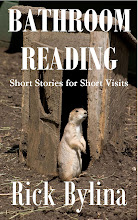As You Wish:
Adverbing Your Verbs, or In Defense of Adverbs in Dialogue Tags
If we're trying to replicate the experience of a
conversation for the reader, we want to convey more than just what is spoken.
In an actual conversation, there are actions and body language, both of which
can be described in the narrative, and will convey something about what the
speaker means. (For example, if he grips his hands into fists, that's
going to convey "anger.")
But "tone of voice" is another way we convey
meaning in a conversation-- especially a meaning that is in contrast with the
words being spoken. A woman might say, "Of course you're right,
dear. You're always right." And you'd think, oh, she thinks her
husband is infallible!
Of course, the speaker probably DOESN'T think her
husband is infallible. She's probably saying that-- how? SARCASTICALLY. If we
were in the room and heard her tone of voice, we would hear the sarcasm in her
words.
In the past, tone of voice was usually conveyed through the
quote tag, the actual verb used for the action of speaking. Remember all
those great synonyms for said? He intoned, or she muttered, or he hissed,
or she demanded, or he commanded, or she exclaimed, or of course, everyone's
favorite: He ejaculated. Alas (I love all of those! :), a couple
decades ago, many writers reacted against the undoubted overuse of those quote
tags and decided the only allowable quote tag was "said". He
said. She said. Simple. Streamlined. But unfortunately, too straightforward to
convey any nuance, any subtext, even any conflict between what is said and what
is meant.
The way in prose we convey tone of voice (if we don't get to
use "expostulated!") is through adverbs. Said + adverb. No, we don't
have to add an adverb to every piece of dialogue. Sometimes the speech line
itself says all we need to know-- "I don't need any help!" for
example. "Luke, I'm your father."
Examples of meaningful quote tag-adverb combos, from a few
of the best dialoguists:
"I wish you'd go home,"
said Lethbridge wearily. (Georgette Heyer)
"Dad," she said, as gently
as she could, "I don't need your support." (Susan Elizabeth Phillips)
At last she said unsteadily,
"It's such a beautiful dream!" (Susan Howatch)
"Come now, John Bell,"
said the bosun reproachfully. (Patrick O'Brian)
"No, no," said Alverstoke
soothingly. "No one is as stupid as Endymion." (Georgette Heyer)
Sure, if your characters say only what they mean, and are
never mistaken, and never raise their voices or ask questions, or characters
who don't always tell the truth the whole truth and nothing but the truth, you
can probably get away with using only "said." But if you're
writing characters with conflicting desires and mixed motivations, who
sometimes lie or sometimes express skepticism or sarcasm, or just have eloquent
and expressive voices, well, consider amplifying the "said" with a
handy adverb-- just when you need to, when the words they speak aren't enough
to convey all of what is really meant.
Bio: Alicia Rasley is a RITA-award winning Regency novelist who has been published by major publishers such as Dell, NAL, and Kensington. Her women’s fiction novel The Year She Fell has been a Kindle #1 bestseller in the contemporary fiction category, and her newest book is Poetic Justice, available on Kindle. Her articles on writing are collected on her website.












